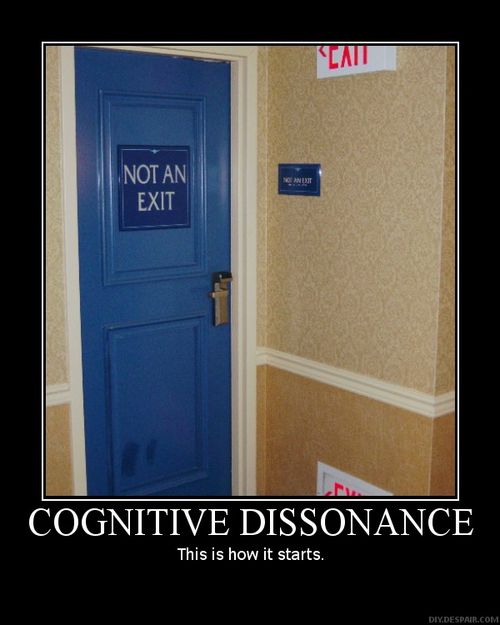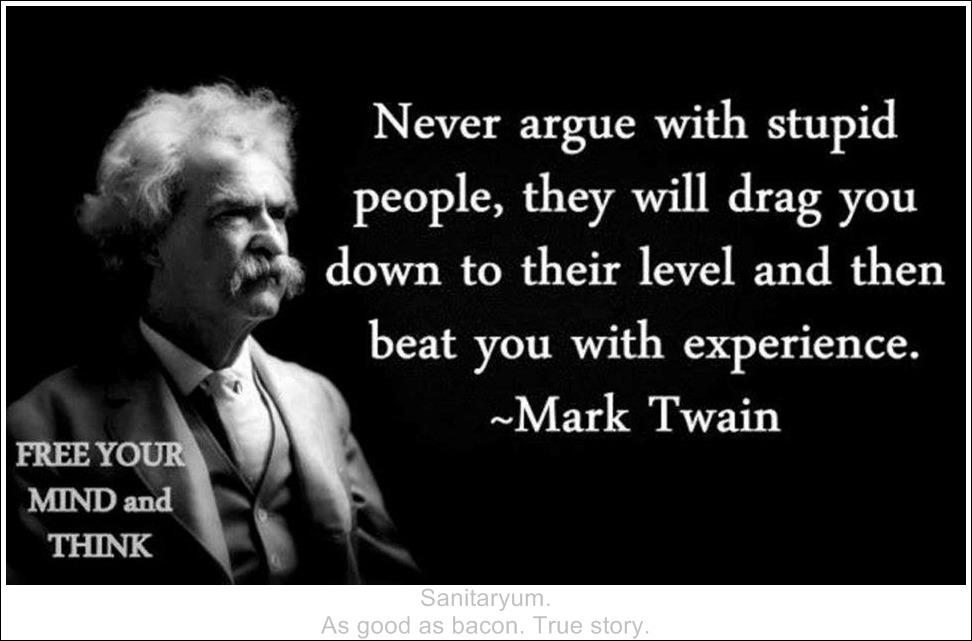Cognitive Dissonance and
Motivated Reasoning
 When someone is faced with conflicting attitudes, beliefs, or
behaviors, they experience a sensation of discomfort referred to as cognitive
dissonance.[1]
People with cognitive dissonance are motivated to resolve the conflicting
notions in a manner which allows them to maintain consistency in their beliefs
and attitudes.[2]
For example, let’s say a creationist happens to discover my blog, and decides
to thoroughly examine the resources I’ve compiled on my “Don’t
Believe in Evolution?” page. They would be facing some serious evidence
that their deeply held beliefs are wrong, yet they would probably find some way
of dismissing it all in favor of their prior convictions. Given that their
creationist beliefs have been reinforced for years, have become a major aspect
of their identity, and are likely shared by many of their family and friends, letting
go of them would be a difficult task. Thus, they partake in a behavior
psychologists refer to as motivated reasoning, which is the unconscious
tendency of individuals to fit their processing of information to conclusions
that suit some end or goal.[3]
As political scientist James Tabor put it, “they retrieve thoughts that are
consistent with their previous beliefs, and that will lead them to build an
argument and challenge what they're hearing."[4]
When someone is faced with conflicting attitudes, beliefs, or
behaviors, they experience a sensation of discomfort referred to as cognitive
dissonance.[1]
People with cognitive dissonance are motivated to resolve the conflicting
notions in a manner which allows them to maintain consistency in their beliefs
and attitudes.[2]
For example, let’s say a creationist happens to discover my blog, and decides
to thoroughly examine the resources I’ve compiled on my “Don’t
Believe in Evolution?” page. They would be facing some serious evidence
that their deeply held beliefs are wrong, yet they would probably find some way
of dismissing it all in favor of their prior convictions. Given that their
creationist beliefs have been reinforced for years, have become a major aspect
of their identity, and are likely shared by many of their family and friends, letting
go of them would be a difficult task. Thus, they partake in a behavior
psychologists refer to as motivated reasoning, which is the unconscious
tendency of individuals to fit their processing of information to conclusions
that suit some end or goal.[3]
As political scientist James Tabor put it, “they retrieve thoughts that are
consistent with their previous beliefs, and that will lead them to build an
argument and challenge what they're hearing."[4] 
Conflicting Brain
During the run-up to the 2004 presidential election, psychologist Drew
Westen led a study wherein ardent George Bush and John Kerry supporters were
each presented with statements from the candidates clearly showing that they
were contradicting themselves.[5]
To no one’s surprise, each group saw no fault in their favored candidate, yet remained
critical of the other. [6]
During the experiment, fMRI scans showed the brains of the participants’ were
inactive in their reasoning centers, while areas associated with emotions and
moral judgments lit up. [7]
On top of that, once subjects came to a satisfactory conclusion about their
candidate, the area of the brain associated with pleasure became active. [8]
This likely acted to reinforce the feeling that their rationalizations were
logically sound.
Extraordinary Evidence Requires Extraordinary Rationalizations
So what happens when people are faced with really compelling evidence suggesting their deeply held beliefs are wrong? Not only do they find ways of discrediting the evidence, their rationalizations can actually convince them to adhere to their beliefs more fervently.[10] Such was the case in a study by political scientists Brendan Nyhan and Jason Reifler. In this study, they showed participants quotes by George W. Bush asserting that Saddam Hussein had WMDs, then quotes from the Bush-commissioned Iraq Survey Group report that refuted his assertions.[11] Conservative participants not only still believed Saddam Hussein had weapons of mass destruction, but they were even more convinced after reading the quotes from the Iraq Survey Group.[12]
The Education Effect
Surely a higher level of education dampens the effects of motivated
reasoning, right? Well, not really. Studies show the higher the education
level, the higher the bias.[13]
This would be why in a 2008 Pew study, 19% of college educated Republicans
believed humans were causing the earth to warm vs. 31% of non-college educated
Republicans. [14]
As political scientist Milton Lodge put it “People who have a dislike of some
policy—for example, abortion—if they're unsophisticated they can just reject it
out of hand, but if they're sophisticated, they can go one step further and
start coming up with counterarguments."[15]
This confirms a long-held observation of mine that smart people find smart
reasons to believe stupid things.
Dunning-Kruger Effect


For those who are less educated on a subject, the Dunning-Kruger effect
may still lead to a higher level of blind faith and motivated reasoning. The
effect is the result of an illusory superiority bias, which leads ignorant and
incompetent people to believe they are far more intelligent and competent than
they actually are.[16]
Conversely, those who are more intelligent and competent tend to underestimate
their abilities. [17]
I’ve seen many examples of this from creationists on the internet. One
proclaimed that he knew more about evolution than anyone on the comment board. Yet,
when I asked him about the 2nd best evidence for evolution besides
the fossil record (i.e. genetic evidence), he became agitated and belligerent. Go
figure.
Tu Quoque
Fantastic example of motivated reasoning (Richard Dawkins dowsing
experiment)
https://www.youtube.com/watch?v=DdjYGaINLwo&list=FLrT9OWupoCp5Jf8HwhyW-4A
Good article explaining the political brain study
I believe the psychological phenomena leading to blind faith are likely
experienced by many theists who read my blog. However, some may argue that I am
just as guilty of dismissing superior evidence and arguments as are theists. For
many, this conviction that both sides of the culture war are equally pig headed
and dismissive leads to what I have dubbed the “head in the sand effect.” That
is, they ignore what I have to say because they believe I am far too certain of
my convictions to present information accurately. To tell you the truth, people
would be right to be skeptical of my motives given my obvious bias. However,
there are some big differences between ardent Secular Humanists such as myself
and close-minded theists:
- We seek to believe in only that which is supported by the evidence, not merely what we wish to be true.
- We are willing to change our minds or at least be skeptical of our views when presented with superior evidence.
- We are very aware of the human tendency to rationalize, and actively seek to minimize its effects.
Conclusion
In the end, we are all guilty of motivated reasoning. We are human after
all, and we have the exact same evolutionarily driven impulses and cognition
patterns as the rest of our species. However, there are certainly some who are
more apt to give in to these impulses and ignore evidence, while others are
more adept at thinking critically about their own motivations.
Resources:
https://www.youtube.com/watch?v=DdjYGaINLwo&list=FLrT9OWupoCp5Jf8HwhyW-4A
Hi, I loved your article! I was wondering, have you ever considered that there could be a difference in the brain function between someone who practices motivated reasoning, and someone who doesn't. I realise you say we all partake at some point, but I imagine one is for no gain, so more severe, and one is calculated, such as to gain an advantage. I'm thinking along the lines of mild Psychosis, any thoughts?
ReplyDeleteGlad you liked it! Sorry it took so long to respond. In my opinion, I think it's all a natural reflex. Our worldview is threatened, and our brain tries to restore balance. The question is, what is going on in the brains of true self-skeptics who are able to allow their most deeply held beliefs to be challenged? I think it's a trained response that takes discipline.
Delete